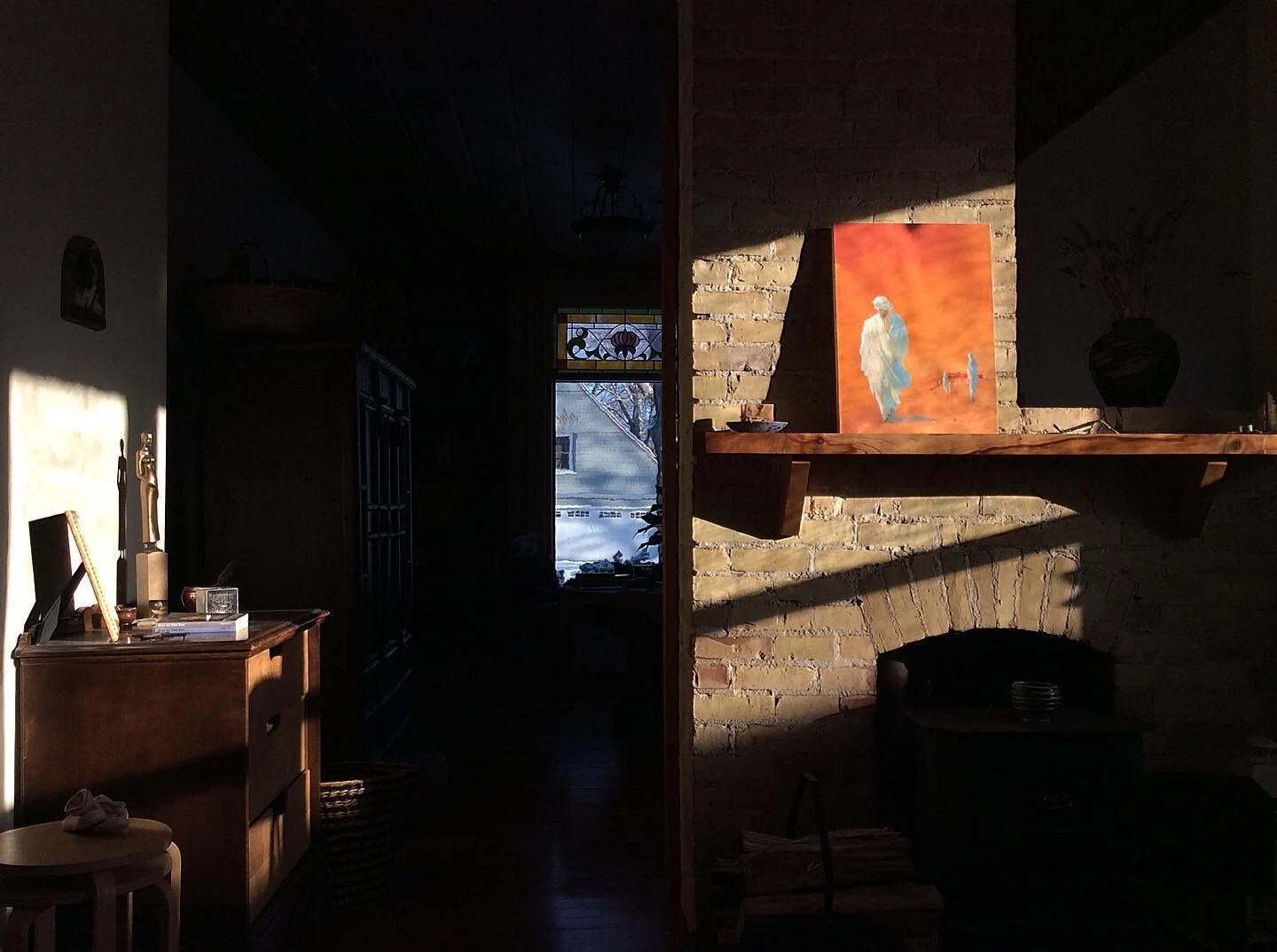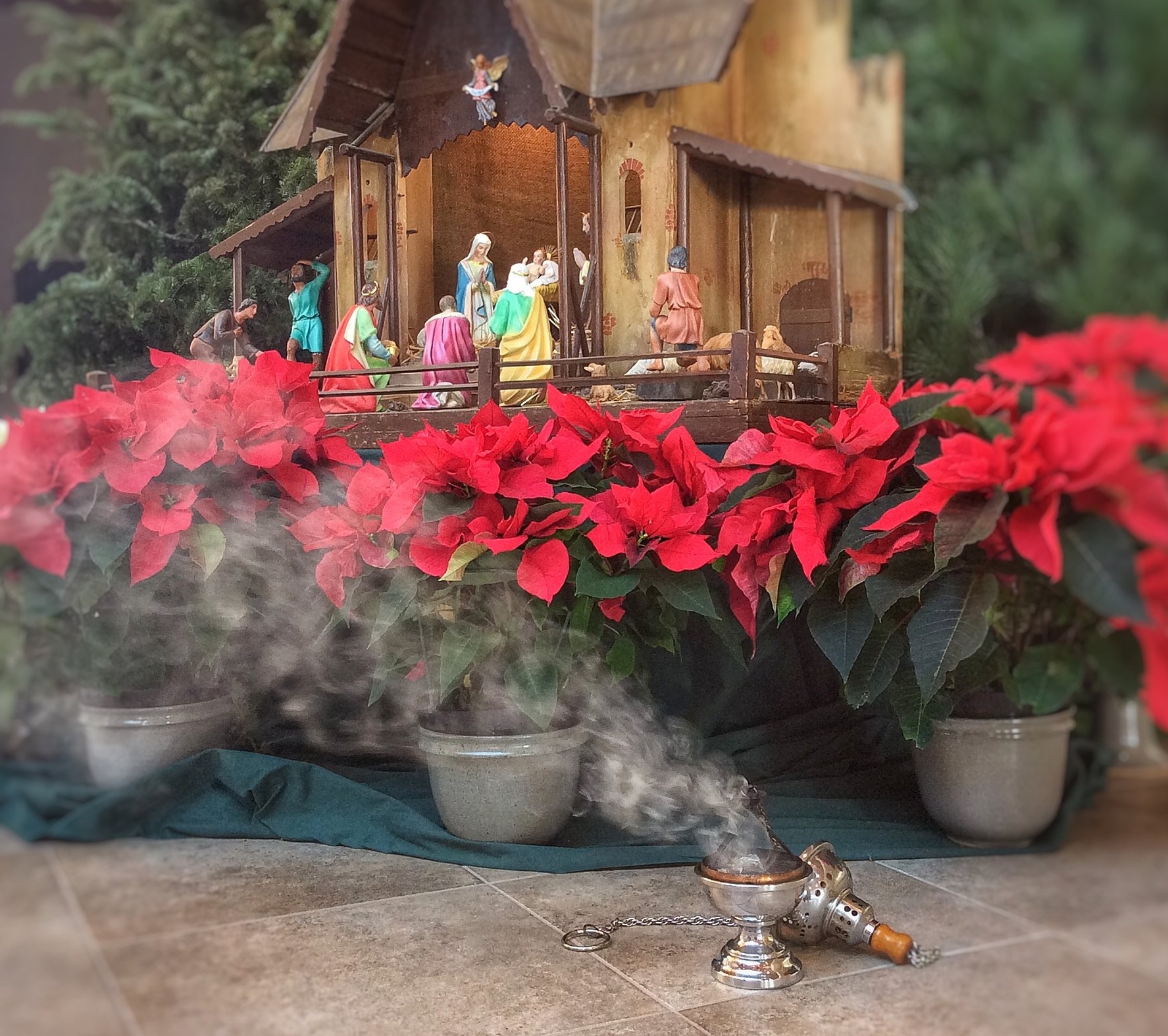Morning sun shining on the “pregnant Mary” on our house altar.
“...and the darkness has not overcome it.”
Friends,
We have arrived at the 12 Day of Christmas! Some probably like me a bit exhausted from the walk, others eager to go on. So what shall we do with the manger, Mary and Joseph, the shepherds, and the three wise men when the decoration is put away? How to take Emmanuel, God with us, along with us into “ordinary time” (as the liturgical year has it)?
Today, on this Eve of Epiphany, I invite you to the last stop of our journey, namely to reclaim the living word, helped along by a wise woman, Hildegard of Bingen. (Tomorrow we will be back one more time with a farewell blessing.)
Already as a child I was drawn to the other narration of Divine birth, as the gospel of John has it, which is a far cry from the romantic (or romanticized) image of the nativity scene. Still it tells the same story. You might want to read it aloud and listen to its sound:
In the beginning was the Word,
and the Word was with God,
and the Word was God.
Thus the word was with God
in the beginning.
Through this word
all things were made,
and without it
nothing was made that has been made.(…)
And
The Word became flesh and dwelled among us.
Those somewhat cryptic but also deeply philosophical lines (retold by heart, leaving out the irritating pronouns) always captured my imagination. For the Gospel writers the story of Divine birth wasn't already staged as what became the traditional image of the holy family. Instead, it needed to be unpacked each time again. As we have walked the 12 Days of Christmas together this season it has become a journey inward, a journey of the heart, to the heart, where Divine truth wants to dwell, becoming enfleshed in us.
While the nativity story is the one every child can understand, the evangelist John offers a quite different Christmas story, which reads like a metaphorical subplot to the happening in Bethlehem. It is, one might think, the story told for the rational mind, the philosophical version of the Holy birth.
I was delighted to find that Hildegard of Bingen, the medieval Abbess, scholar and healer, was drawn to the same text, just like my favorite Jewish thinker Martin Buber was. Both these thinkers help us ponder the living word, the word from the beginning, which becomes flesh, embodied, not by magic, but by Divine birth, in Mary, and in every human being, in us.
In her Liber divinorum operum Hildegard describes this word of the beginning with love (Caritas) which she identifies as the creation principle, the first cause of the world, exemplified in the creative ur-powers of Divine love. This is expressed in the Latin term “rationalitas,” just as we find it as “logos” in the greek text of the John gospel (“In the beginning was logos”). Both words for Hildegard hold the trinity that encompasses Divine creation, ordering wisdom, and self giving love. (Zátonyi 2017,137, see Furchert 2021)
God creates via the sounding word of the beginning, which creates the whole universe, via Divine love. For Hildegard Divine rationalitas itself is the root that encompases understanding, ordering and communicative powers. In the same time all living beings are rooted in her and all rationality has its primal ground in her (what different kind of rationality that must be than the stilted “reason” we know today, a rationality bound in self giving love and ordering wisdom!)
As human beings we are created as a mirror image of this original living word, knowledgeable, able to co-create, to love and to gain wisdom.
What does that all mean?
The Logos, God's word has been laid into us from the beginning, and we met choose: will we go pregnant with it and birth it?
Let's proclaim loudly and humbly the good news of God with us: We are children of God, daughters and sons of the Divine word, God incarnate. This is what Rumi means when he finds himself knocking at the door from the inside: God is already in us. This is both great grace and distinctly frightening.
Therefore, we are quite skilled at finding distractions to protect us from the realization of the incarnation in our own life. The story of Jesus birth has been reduced to a "Happy birthday Jesus" party, and Merry Christmas wars, God incarnate has been pushed out of the manger, out of our consciousness, out of being enfleshed.
“We are children of God, daughters and sons of the Divine word, God incarnate.”
Still, God wants to be born in each of us – in fact already is born in each of us. This is good and frightening news. We are all called to the holy birth, in us, birthing hope into despair, light into the dark, joy into sadness, and truth into bleak reality.
There is no other Christmas story than this: The word wants to become flesh in us. This realization touches me so profoundly and deeply, and unites the longing heart with the searching mind.
As Jesus shivers in front yard stable scenes, left alone with the story tellers and preachers, you can hear the Word knocking at your door, ever so slightly. The Word of eternal creation which wants to make everything anew. Even in my little fuzzy heart.
This is more than we can ask for, and surely more than we can understand. On the 12th day of Christmas story I have no other blessing than this to share:
A Blessing for your transition into “ordinary times”
Open your heart,
make room in your stable,
Then turn around and look again:
The Divine word has always been dwelling in it.
Today, always.
And you have just begun to see.
Peace to you, dear pilgrim. Peace.
Almut with Chuck and little one



